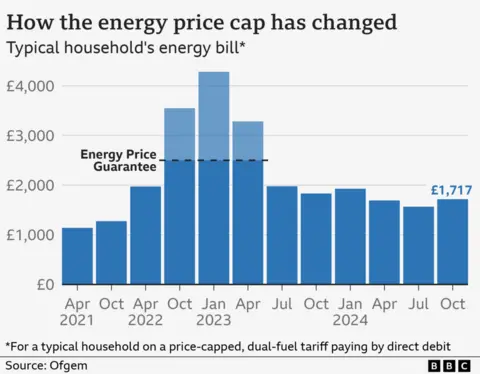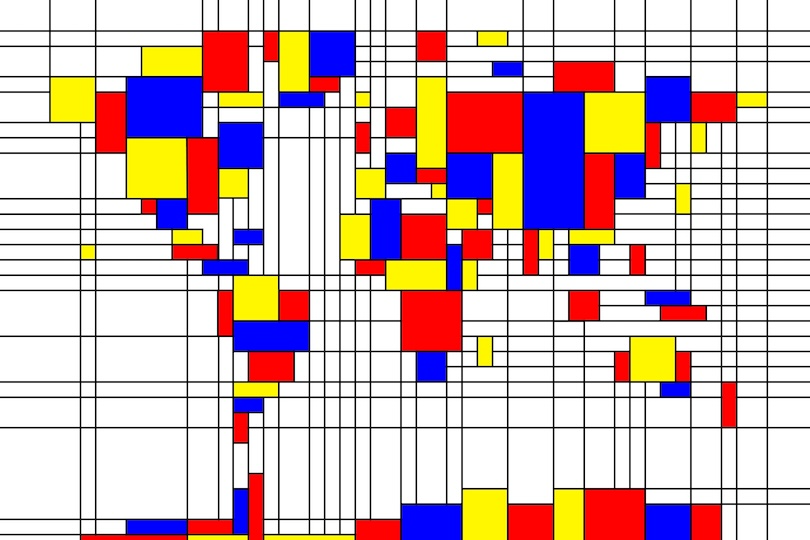
 Getty Images
Getty Images
A 10% domestic gas and electricity price rise has taken effect as debate continues over the withdrawal of additional support.
A household in England, Wales and Scotland using a typical amount of gas and electricity will pay £1,717 a year from now, a rise in the annual bill of £149.
It comes as winter approaches without extra cost-of-living payments for those on low incomes, and as winter fuel payments are withdrawn for about 10 million pensioners.
Energy firms say they are helping struggling and vulnerable customers.
Price cap changes
Energy prices for about 27 million homes in England, Wales and Scotland is governed by a price cap, calculated by the energy regulator Ofgem. It is set every three months and affects the price paid for each unit of gas and electricity.
Under the cap, prices have fallen twice this year - in April and July - but now, at the start of October, they have increased by about £12 a month for a typical user.
A final bill depends on the amount of energy used, but to calculate the effect on an annual bill, billpayers can add 10% to their current bill.
Standing charges have risen by one penny a day for gas and also for electricity, but the regulator is considering reforming the system.


The price cap is illustrated by Ofgem in terms of an annual bill for a household using a typical amount of gas and electricity.
That annual bill is lower than last winter, but charities say many people will struggle to cover the cost.
Some households have built up debt to their suppliers. Ofgem said nearly £3.7bn is owed collectively.
Steve Vaid, chief executive of the Money Advice Trust, the charity that runs National Debtline, said: "This only highlights what we have been saying for some time - without urgent support for households facing unaffordable arrears, energy debt will only rise further."
Some households will have less support because the final cost-of-living payment was made to eight million people on means-tested benefits in February.
For pensioners, the previously universal winter fuel payment, worth up to £300, will now only be paid to those on low incomes who receive certain benefits.
The payment is a devolved matter in Scotland and Northern Ireland and the Scottish government confirmed it will also no longer provide winter fuel payments to all pensioners.
While some previous recipients say they do not need it, charities and many MPs are concerned about pensioners still on a relatively small income who will miss out.
Forecasters have given some comfort with a change to their prediction for energy bills when the next cap comes into force in January.
Consultancy Cornwall Insight, which analyses the sector, has predicted a 1% fall in January to an annual bill of £1,697 for a household using a typical amount of energy.
Energy companies have said a voluntary initiative they have run in the last four years has identified vulnerable customers.
The sector's trade body, Energy UK, said extra support totalling £500m had been given to those in need.
In specific terms, the latest change in prices means:
Gas prices are capped at 6.24p per kilowatt hour (kWh), and electricity at 24.5p per kWh - up from 5.48p and 22.36p respectively. A typical household uses 2,700 kWh of electricity a year, and 11,500 kWh of gasHouseholds on prepayment meters are paying slightly less than those on direct debit, with a typical bill of £1,669Those who pay their bills every three months by cash or cheque are paying more, with a typical bill of £1,829Standing charges - a fixed daily charge covering the costs of connecting to a supply - have gone up to 61p a day for electricity and 32p a day for gas, compared with 60p and 31p respectively, although they vary by region

How some pensioners can claim support
Hundreds of thousands of low-income pensioner households eligible for pension credit currently fail to claim it.
The government says it is worth an average of £3,900 a year and claiming it can qualify people for other financial support such as winter fuel payments.
You can check your eligibility for pension credit via the government's online calculator.
Information is also available on how to make a claim. There is also a phone line available on weekdays - 0800 99 1234.
Guide to benefits, when you qualify and what to do if something goes wrong, are provided by the independent MoneyHelper website, backed by government.
Benefits calculators are also run by Policy in Practice, and charities Entitledto, and Turn2us.

 Movie
Movie 2 months ago
31
2 months ago
31 






![Presidents Day Weekend Car Sales [2021 Edition] Presidents Day Weekend Car Sales [2021 Edition]](https://www.findthebestcarprice.com/wp-content/uploads/Presidents-Day-Weekend-car-sales.jpg)



 English (United States)
English (United States)